Social media and SEO are both essential parts of a modern-day business. While they are often treated as separate channels, it’s important to integrate them when possible to maximise the mutual benefits that each channel can offer to your business.
In this article, we will explore five strategies for aligning your social media and SEO efforts to maximise their benefits. We’ll discuss:
Table of Contents
- Strengthening brand authority by interlinking your website with social media profiles
- Boosting organic traffic through the creation of link bait content on social platforms
- Leveraging social media for outreach to content owners you reference
- Amplifying your reach by repurposing content across various social media platforms
- Maximising outcomes through the integration of social media and SEO communications
Strengthening brand authority by interlinking your website with social media profiles

It’s important to let search engines know which social media profiles are associated with your company. By linking the two together, you're making it easier for search engines to associate the value of your combined efforts from your SEO and your social media recognition.
Another benefit of linking your website and social media profiles together is that it allows for a more seamless user experience for your website visitors to find your social proof. Similarly, people who find you on social media first will have easy access to your site from your social media profiles.
How to link your website and social media profiles together
The first step is to make a list of all your social media profiles that you would like to link to your website. Next, you want to use Schema markup to signal to the search engines the connection between your website and your social media profiles.
You can use the “SameAs” Schema markup property to indicate the relationships between your website and social media profiles. This lets the search engines know that all the properties are part of the same entity.
Below is an example of how include the SameAs Schema markup on your website using HTML:
|
<script type="application/ld+json"> { "@context": "http://schema.org", "@type": "Organization", "name": "Your Company Name", "url": "https://www.yourwebsite.com", "sameAs": [ "https://www.facebook.com/YourPage", "https://twitter.com/YourTwitter", "https://www.linkedin.com/in/yourprofile", "https://www.instagram.com/yourinstagram", "https://www.pinterest.com/yourpinterest", "https://www.youtube.com/user/yourchannel" ] } </script> |
Before installing this code, replace the example URLs on the code above with the social media profiles for your company.
There are several ways to install Schema markup to your site but if you need some additional guidance on how to install it, you can check out this Schema markup guide to learn more.
After you’ve installed the HTML code on your site, it’s important to test it to make sure it's installed properly. You can use either one of the tools on this page to test your Schema markup code.
Boosting organic traffic through the creation of link bait content on social platforms
Social media profiles allow you to place a link of your choice in your bio section once you meet certain requirements. Once you can add a URL to your social media profiles, you can link back to your website so users can find your company's website more easily.
Aside from people being able to find your website easier, if you create viral content, you can gain backlinks to your social media profiles, which can help give an SEO boost to your website. Social profile pages are indexed by search engines, so any links pointing to your social media page pass along SEO ranking power.
There are many companies doing well on social media with viral content. Let's look at a couple of examples below.
Ryanair
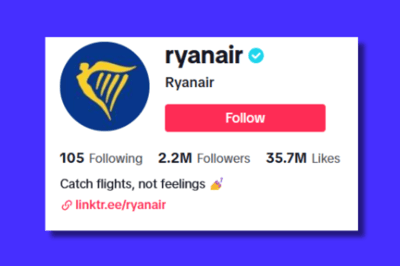
While it might seem hard for an airline company to make viral videos and create a loyal social media following, Ryanair has done just that. Amassing a following of over two million followers, Ryanair uses humour to attract a large audience on social media, but the benefits don’t stop there.
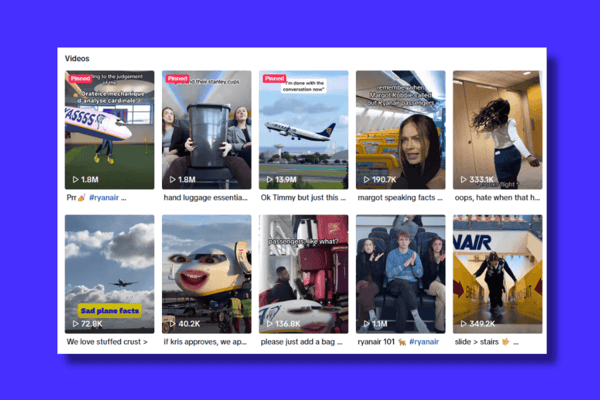
Due to their viral videos on TikTok, Ryanair's TikTok profile has been linked to by over 800 websites, including several popular domains such as Refinery 29 and Fiverr.
Several of the articles that mention Ryanair also have links pointing to them, which provide an additional SEO boost. All of this SEO ranking power gets funnelled to the link of their choice on their social media profile to provide direct traffic, as well as ranking power to help boost keywords on their website.
Gymshark
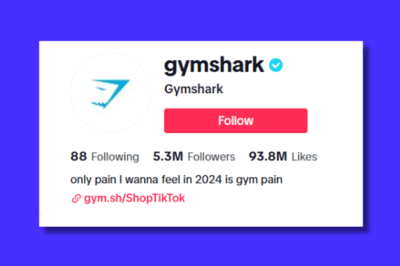
Gymshark is another company that regularly publishes viral content and has amassed more than five million followers.
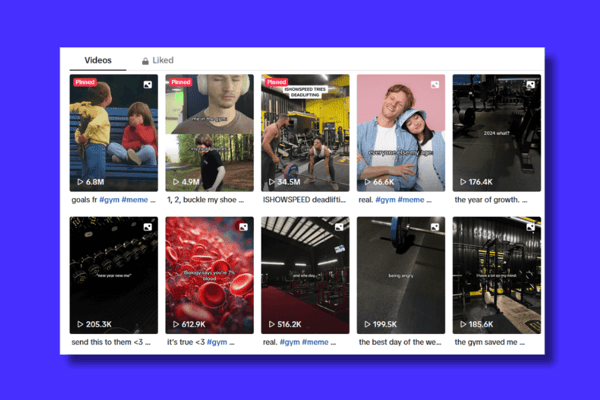
Due to the popularity of their content, the TikTok channel has gained over seven hundred links from popular sites such as HubSpot, Shopify, and Digital Marketing Institute.
All of the backlinks pointing to their social media profiles pass on an SEO boost to the links they list on the bio sections of their social media profiles as well. Brands such as Gymshark and Ryanair are good examples of how good social media marketing can boost your SEO efforts.
Aim to create viral content on your social media profiles so other websites will be inspired to link to your content and you can gain an SEO boost to your main website like the companies mentioned above.
Leveraging social media for outreach to content owners you reference
When creating content for your website, it’s important to link out to high-quality third-party sites and resources that can be useful to your users. Relevant outbound links add value to your content. They also allow users to check your sources and provide additional resources to help answer their questions.

11 SEO Link Building Techniques That Work
A good practice to follow when mentioning third-party sites in your content is to reach out to them on social media to foster relationships and encourage the distribution of the newly created content. By sharing the content on their social media platforms, it benefits both their site and your website as well.
It’s important to build relationships with third-party sites that you mention in your content, as it shows that you are a fan of their company and their content. By reaching out and introducing your business it gives the other company a chance to see your content and to potentially link to your site in the future.
Amplifying your reach by repurposing content across various social media platforms
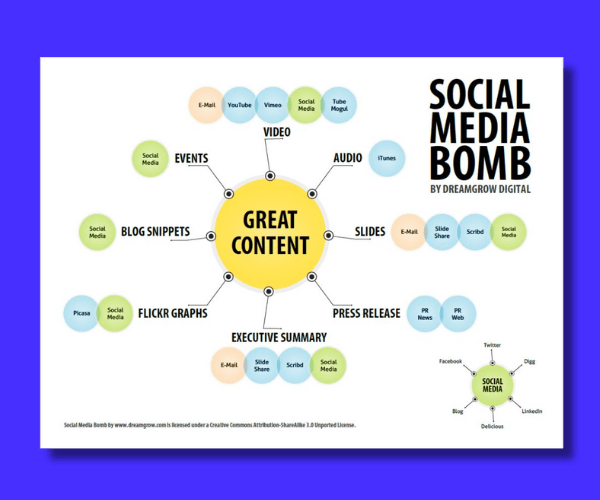 Source: DreamGrow
Source: DreamGrow
High-quality content takes significant time, effort, and resources to create. To maximise the benefits of your content, consider repurposing it and adapting it to different formats that work best for each of your social media channels.
To illustrate, let’s say you wrote a long post on “Five tips to grow your social media”, and you want to figure out multiple ways to promote it. One solution would be to adapt and format the post to your social media channels to amplify distribution.
For example:
- Shorten your post into five snippets and create a carousel post on X (formerly Twitter)
- Use your shortened snippets to create an engaging TikTok video sharing your tips
- Post either a carousel or video version of your content to Instagram
- Create a summary version of your post for YouTube and link to your full post from the description
This strategy allows you to take one post and share it in four different ways, including one that will gain a backlink from YouTube. Tools now exist that can help automate the repurposing and reformatting of content, and you can use a social media management tool like Sendible to schedule your content to save even more time.
If you want to get creative and find more ways to promote your content, test several content promotion strategies to increase traffic to your site.
Maximising outcomes through the integration of social media and SEO communications
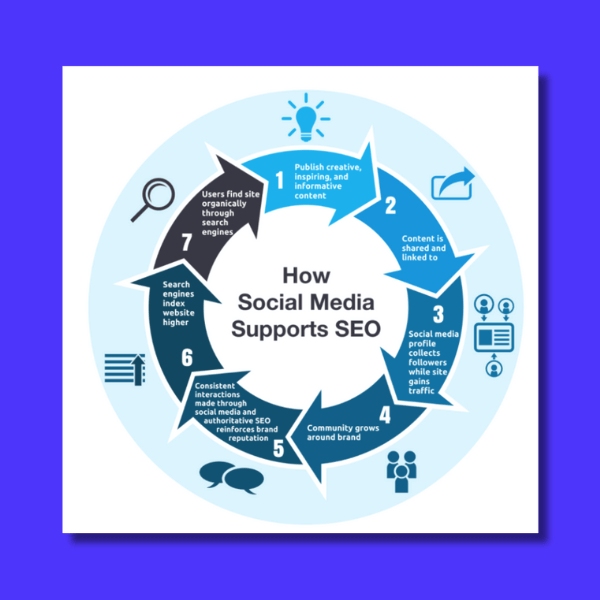 Source: Lyfe Marketing
Source: Lyfe Marketing
Social media and SEO departments are often compartmentalised and don’t work together, especially at larger companies. One easy way to maximise the effectiveness of both channels is to collaborate on projects together.
Social media staff at your company might be more up-to-date on social media trends. If this information is passed on, it can help the SEO department publish viral content ahead of the curve.
Similarly, the SEO department can share search volume stats to help influence the description or hashtags of a social media post to increase its chances of going viral or being seen. Also, by working on content together, you can get a head start on your content repurposing efforts mentioned in the previous tip.
Conclusion
Combining forces in SEO and social media has a lot of benefits for both channels. By collaborating together, you can streamline your workflow and boost each other's channels in meaningful ways that can help increase rankings, engagement and authority for your company.
How are you currently combining SEO and social media efforts at your company?
If you have not started yet, consider trying out one of the tips above to help get you started on joining forces. Remember that a strong website creates a great opportunity for social engagement, and an engaged social community can help elevate your rankings. Together, they’re a powerful force.



